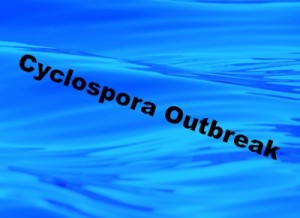1. How is Cyclospora transmitted by food?
 Cyclospora cayetanensis is a parasite. People can become infected with Cyclospora by ingesting sporulated oocysts, the infective form of the parasite, in food. Unsanitary conditions at a farm, processing plant or distribution center can allow human feces containing Cyclospora oocysts to contaminate food. It generally takes days or even weeks for these fecal oocysts to become sporulated, and thereby infective, according to the Centers for Disease Control and Prevention (CDC). So the contamination of the food happens days or weeks before it is eaten. This makes it more difficult to find the source of a Cyclospora food poisoning outbreak.
Cyclospora cayetanensis is a parasite. People can become infected with Cyclospora by ingesting sporulated oocysts, the infective form of the parasite, in food. Unsanitary conditions at a farm, processing plant or distribution center can allow human feces containing Cyclospora oocysts to contaminate food. It generally takes days or even weeks for these fecal oocysts to become sporulated, and thereby infective, according to the Centers for Disease Control and Prevention (CDC). So the contamination of the food happens days or weeks before it is eaten. This makes it more difficult to find the source of a Cyclospora food poisoning outbreak.
2. What evidence is needed to prove that a grower, processor, distributor, grocery store and/or restaurant is legally responsible for Cyclospora infections?
According to Fred Pritzker, a national food safety lawyer, the epidemiological evidence gathered by state and local health departments can prove that a grower, processor, distributor, grocery store and/or restaurant is legally responsible for an outbreak of Cyclospora infections. If most of the people sickened in an outbreak ate at the same restaurant (either one location or several locations if it is a chain restaurant) that is sufficient evidence to file lawsuits seeking compensation for the victims. According to Pritzker, compensation can include amounts for hospital and other medical costs, lost wages, pain, emotional suffering, loss of quality of life and other lawful damages.
3. What foods can cause Cyclospora infection outbreaks?
In the United States past Cyclospora outbreaks have all been caused by imported fresh produce, including raspberries, basil, snow peas, and mesclun lettuce. Other fresh produce imported from south of the boarder (purple onions, green onions, iceberg lettuce, tomatoes, peppers) could get contaminated and cause an outbreak. Fresh vegetables are the most likely source of the current Cyclospora outbreak in Iowa, Nebraska, Texas, Illinois, Kansas and Wisconsin, according to the Iowa Department of Public Health. Fresh in this context means not cooked, not necessarily just picked.
4. Should cyclosporiasis be reported to a state health department and the CDC?
Yes, every case of cyclosporiasis (the illness caused by Cyclospora parasites), should be reported to a state health department, which then should report the case to the CDC. The CDC has a Cyclosporiasis Surveillance Case Report form for this purpose. CDC, in collaboration with public health departments, analyzes each reported case for evidence of linkage to other cases. This facilitates rapid identification and investigation of outbreaks.





Could olive products in garden salad cause Cyclospora?
I suppose that is possible. Human feces tainted with Cyclospora oocysts would have to have been on the olives for days, though. If the source of this outbreak was salad served at a restaurant, it was far more likely the lettuce that was tainted.
Didn’t you mean to say that “because one can get a Cyclosora infection from garden-fresh vegetables”? Or did I misunderstand?
Yes, you’re right. I made the change. Thanks.
Yes, I meant to say that one can’t get Cyclospora infection from garden-fresh vegetables. Only unsporulated Cyclospora oocysts are excreted with human feces. These unsporulated oocysts have to be on the plants a few days to sporulate. One has to consume sporulated oocysts to get an infection. However, you are correct because it is possible to get Cyclospora infection from garden-fresh vegetables if the human feces were on the plants for several days before the plants were picked. I just deleted the offending sentence.